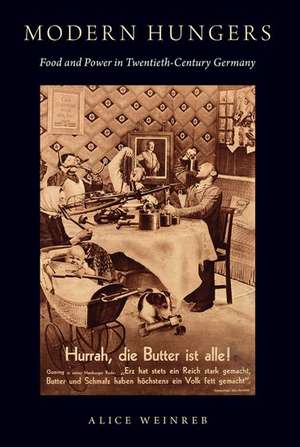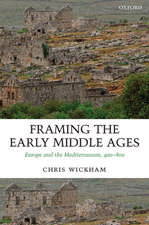Modern Hungers: Food and Power in Twentieth-Century Germany
Autor Alice Weinreben Limba Engleză Paperback – noi 2019
| Toate formatele și edițiile | Preț | Express |
|---|---|---|
| Paperback (1) | 200.35 lei 10-16 zile | |
| Oxford University Press – noi 2019 | 200.35 lei 10-16 zile | |
| Hardback (1) | 481.86 lei 10-16 zile | |
| Oxford University Press – 15 iun 2017 | 481.86 lei 10-16 zile |
Preț: 200.35 lei
Preț vechi: 239.75 lei
-16% Nou
Puncte Express: 301
Preț estimativ în valută:
38.34€ • 40.13$ • 31.72£
38.34€ • 40.13$ • 31.72£
Carte disponibilă
Livrare economică 04-10 martie
Preluare comenzi: 021 569.72.76
Specificații
ISBN-13: 9780190092481
ISBN-10: 0190092483
Pagini: 330
Ilustrații: 23 hts
Dimensiuni: 231 x 155 x 23 mm
Greutate: 0.64 kg
Editura: Oxford University Press
Colecția OUP USA
Locul publicării:New York, United States
ISBN-10: 0190092483
Pagini: 330
Ilustrații: 23 hts
Dimensiuni: 231 x 155 x 23 mm
Greutate: 0.64 kg
Editura: Oxford University Press
Colecția OUP USA
Locul publicării:New York, United States
Recenzii
In this fascinating analysis, impressive in its nuance and complexity, Weinreb addresses issues such as warfare, modernity, gender, race, and divergent political regimes to demonstrate that concerns over food and hunger were constitutive of economic systems, political policies, and sociocultural structures between 1914 and 1989....Weinreb shows how Germans were reintegrated into the global community as victims, rather than perpetrators, of hunger in the immediate post-WW II and early Cold War years, enabling a distancing from the Nazi past. Highly recommended.
Alice Weinreb's imaginative study reveals how outsized a role the production, distribution, and consumption of food has played across Germany's twentieth century
Finally we have a book that recovers the remarkably stubborn and yet changing experience of hunger in Germany across the twentieth century. Weinreb's deeply researched and majestic analysis takes us from global politics, to national systems of rationing and welfare, to the intimate and everyday forms of government that took hold of households and bodies to explain who got what to eat. An important and impressive achievement.
In this fascinating and highly original study of 'food and power', Alice Weinreb deftly analyzes the significance of food, its production, consumption, and acquisition, as well as the discourses it produced, for the construction of German identity, both as victims and villains, over the course of a tumultuous twentieth century and multiple regimes. Combining wide-ranging theoretical reflection with deeply researched detail on everyday life and perceptions, this book combines transnational food studies with an innovative account of the peculiarities of German history.
Weinreb encourages us to see the long arc of twentieth-century German history in novel ways...An extremely original and thought-provoking book.
Modern Hungers contributes to a growing trend in German historiography of bridging rather than assuming (or even highlighting) ruptures of state and society in the twentieth century. Indeed, central to Weinreb's argument is that the particular pressures of the two world wars, the depression, dictatorship, and the cold war critically informed the trajectory of the modern politics of food...Modern Hungers offers a readable, teachable, and accessible master class in biopolitical analysis of modern statecraft. The politics of starving bodies, raced bodies, gendered bodies, and fat bodies in the twentieth century is not a story unique to Germany; it is rather an ongoing story to this day...Interdisciplinary scholars of food, hunger, and satiety in almost every context would do well to take note of this important book and consider its applications for their own fields of study.
Alice Weinreb's imaginative study reveals how outsized a role the production, distribution, and consumption of food has played across Germany's twentieth century
Finally we have a book that recovers the remarkably stubborn and yet changing experience of hunger in Germany across the twentieth century. Weinreb's deeply researched and majestic analysis takes us from global politics, to national systems of rationing and welfare, to the intimate and everyday forms of government that took hold of households and bodies to explain who got what to eat. An important and impressive achievement.
In this fascinating and highly original study of 'food and power', Alice Weinreb deftly analyzes the significance of food, its production, consumption, and acquisition, as well as the discourses it produced, for the construction of German identity, both as victims and villains, over the course of a tumultuous twentieth century and multiple regimes. Combining wide-ranging theoretical reflection with deeply researched detail on everyday life and perceptions, this book combines transnational food studies with an innovative account of the peculiarities of German history.
Weinreb encourages us to see the long arc of twentieth-century German history in novel ways...An extremely original and thought-provoking book.
Modern Hungers contributes to a growing trend in German historiography of bridging rather than assuming (or even highlighting) ruptures of state and society in the twentieth century. Indeed, central to Weinreb's argument is that the particular pressures of the two world wars, the depression, dictatorship, and the cold war critically informed the trajectory of the modern politics of food...Modern Hungers offers a readable, teachable, and accessible master class in biopolitical analysis of modern statecraft. The politics of starving bodies, raced bodies, gendered bodies, and fat bodies in the twentieth century is not a story unique to Germany; it is rather an ongoing story to this day...Interdisciplinary scholars of food, hunger, and satiety in almost every context would do well to take note of this important book and consider its applications for their own fields of study.
Notă biografică
Alice Weinreb is an assistant professor of history at Loyola University Chicago.













